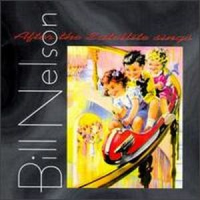Home » Jazz Articles » Album Review » Bill Nelson: After The Satellite Sings
Bill Nelson: After The Satellite Sings
UK-based Esoteric/Cherry Red Records has reissued a number of Nelson's solo albums over the years, and After the Satellite Sings is among his finest recorded dates, signifying one of many albums where he performs as a multi-instrumentalist. Originally released in 1995, this production also reminds us that he was on the fast-track when embracing digital technology. In addition to drum programming, Nelson handles the vocals, keys and synths parts to great effect, often flavored by his manifold guitar phrasings.
Bassist Ian Leese and Dave Cook, who uses the electronic drum octapad lend their hands on a few tracks. Otherwise, Nelson's game-plan consists of largely, vibrant and changeable motifs complete with memorable hooks and a prismatic array of melodic content. These polytonal performances boast many up-tempo grooves, interspersed with concise paradigm shifts; his sustain guitar licks, and soundscapes inflected with Middle Eastern voicings and delicate harmonic overlays. He incorporates numerous rock-based persuasions while also integrating jazzy riffs.
Ultimately, it's a song-oriented endeavor. For example, on "Streamliner" his subdued and poetic vocals atop a mid-tempo groove infer notions that he's letting the listener in on a little secret, and "Zoom Sequence" tenders a quaint melody floating above a sturdy backbeat and enamored by a harmonious and catchy synth passage. Here, Nelson summons recollections of the 70s British Canterbury prog rock scene, triggered by his howling guitar solo and stately themes. Moreover, certain pieces integrate blithe balladry, world music percussion treatments, clipped narratives and vintage Brian Eno style dark ambience on "V-Ghost." The alluring outcomes of these 15-works vividly demonstrate Nelson's all-inclusive musicality and exhaustive imaginative powers, speckled with sporadic doses of fun and frolic.
Track Listing
Deeply Dazzled Nelson; Tomorrow Yesterday; Flipside; Streamliner; Memory Babe; Skull Baby Cluster; Zoom Sequence; Rocket to Damascus; Beautiful Nudes; Old Goat; Squirm; Wow! It's Scootercar Sexkitten!; Phantom Sedan; Ordinary Idiots; V-Ghost; Blink-Agog.
Personnel
Bill Nelson
saxophone, tenorBill Nelson: vocals, electric and acoustic guitars, E-bow, bass guitar, keyboards, piano, marimba, harmonica, percussion, drum programmes, plastic tape recorder and wind-up gramophone; Ian Leese: bass (8); Dave Cook: octapad (10)
Album information
Title: After The Satellite Sings | Year Released: 2015 | Record Label: Cherry Red Records
Comments
About Bill Nelson
Instrument: Saxophone, tenor
Related Articles | Concerts | Albums | Photos | Similar ToTags
For the Love of Jazz
 All About Jazz has been a pillar of jazz since 1995, championing it as an art form and, more importantly, supporting the musicians who create it. Our enduring commitment has made "AAJ" one of the most culturally important websites of its kind, read by hundreds of thousands of fans, musicians and industry figures every month.
All About Jazz has been a pillar of jazz since 1995, championing it as an art form and, more importantly, supporting the musicians who create it. Our enduring commitment has made "AAJ" one of the most culturally important websites of its kind, read by hundreds of thousands of fans, musicians and industry figures every month.




















